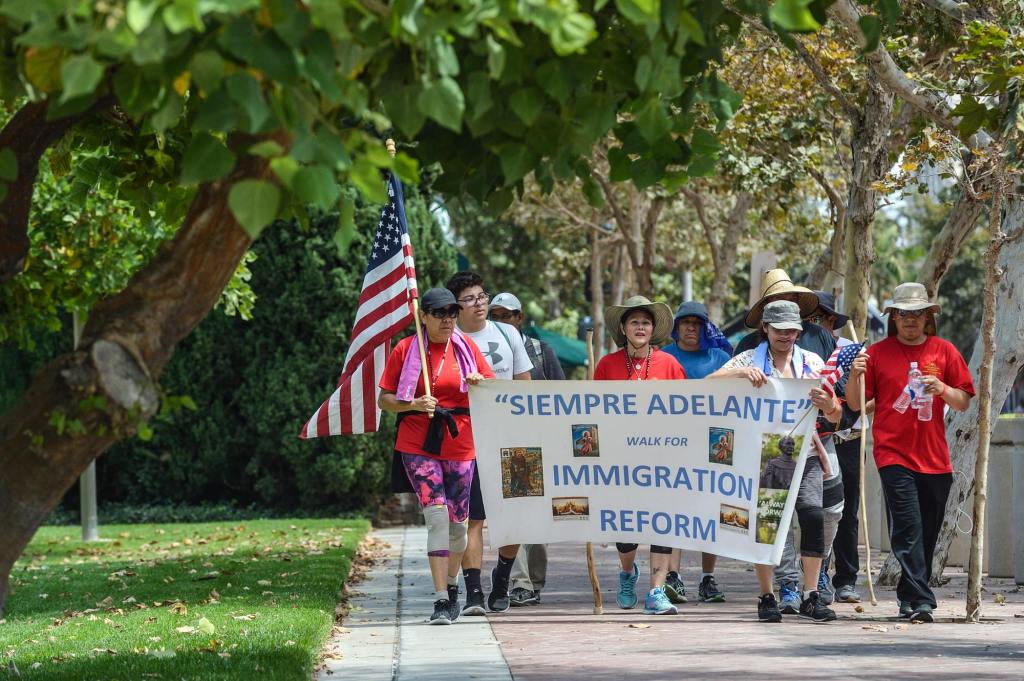Armored vehicles rumble through our neighborhoods. Masked federal immigration agents in unmarked cars ambush people and refuse to identify themselves, in violation of the law. Residents are chased and detained in broad daylight without warrants—while working, driving their children to school, or even following the law and showing up to immigration courthouses for hearings on their cases. Streets and businesses across the county that were once bustling now sit empty.
You might think this sounds like a dystopian Netflix drama about an authoritarian crackdown. But this is happening here—in Orange County, California, in 2025. Detention rates are already at an all-time high, with 93% of people detained having no violent criminal record, and the threat is expected to grow. In just weeks, an infusion of billions of dollars will give ICE a budget larger than most country’s militaries, making it the largest militarized police force in the nation. That should alarm every one of us because ICE is not targeting criminals. When immigrant laborers, students, entrepreneurs, and caretakers are disappearing, it harms the local communities and economies we have worked so hard to build together.
We are two professors—one who grew up in Orange County and continues to raise a family here, and one who teaches at a local university. New data from the USC Dornsife Equity Research Institute (ERI) reveals how deeply undocumented immigrants are woven into Orange County’s communities and economy, and why their futures are tied to ours.
Our data show that nearly a third of Orange County’s residents are immigrants, of which undocumented people represent more than 210,000 people, or ⅕ of all immigrants. Over three-quarters of undocumented people have lived here for more than a decade, raising families, working and contributing taxes, and laying down roots to establish homes. As a result, their ties reach deep into local households and schools. More than 491,000 county residents are either undocumented themselves or live with undocumented family members, including 216,000 U.S. citizens. Among children under five, 16% have at least one undocumented parent, and more than half of U.S. citizens with undocumented family members are 17 or younger. These are not abstract numbers—they are our neighbors, students, co-workers, and the next generation of Orange County residents growing up worried about whether their families will be ripped apart.
Economically, their contributions are undeniable. In 2023, undocumented immigrants in Orange County generated $5.3 billion in spending power, while contributing $603 million in federal taxes and $556 million in state and local taxes. More than 90% are of prime working age, powering industries across the county. They make up 33% of building and grounds cleaning and maintenance workers, 29% of construction workers, and 20% of production workers. Roughly 15% are self-employed, from small business owners to street vendors—forming the entrepreneurial backbone of many neighborhoods.
Yet the current wave of raids and militarized enforcement is unraveling our vibrant community fabric. When workers are too afraid to show up, or families avoid public spaces, the impacts ripple outward. Restaurants, construction projects, school districts, and retail corridors all suffer. Beyond lost revenue, the violent raids that we are seeing daily erode trust in police, weaken safety, and tear apart the social bonds that hold our county together.
Another future is possible, and signs of change are already here. Costa Mesa—once infamous for anti-immigrant crackdowns—is supporting the ACLU lawsuit against unconstitutional immigration enforcement practices, alongside Fullerton, Santa Ana, Anaheim, and Irvine. Some of these cities are also launching immigrant legal defense. The OC Board of Supervisors, in collaboration with community organizations, has amassed $1.5 million for the OC Liberty Fund, to assist immigrant families in asserting their rights and advocating for systemic change. Local school districts are stepping in to provide legal and material support. And across OC, neighbors are organizing mutual aid, providing groceries, observing and documenting unconstitutional raids, and standing up for their communities.
Still, more is needed. Policymakers at every level must speak out and pass legislation supporting immigrant communities by joining lawsuits or allocating funds for legal defense. Business leaders must be honest about how fear is gutting the local economy and stand behind their workers. More lawyers must step up, offering pro bono support to trusted organizations like the Orange County Rapid Response Network that help defend families and hold the government accountable.
Orange County has a choice: allow fear to hollow out our future or lead the way in building a county where all can thrive. What will it be?
Jody Agius Vallejo is professor of sociology and associate director of the USC Equity Research Institute at the University of Southern California. She lives in Fullerton. Sean Angst is assistant professor of public administration at California State University, Fullerton.

